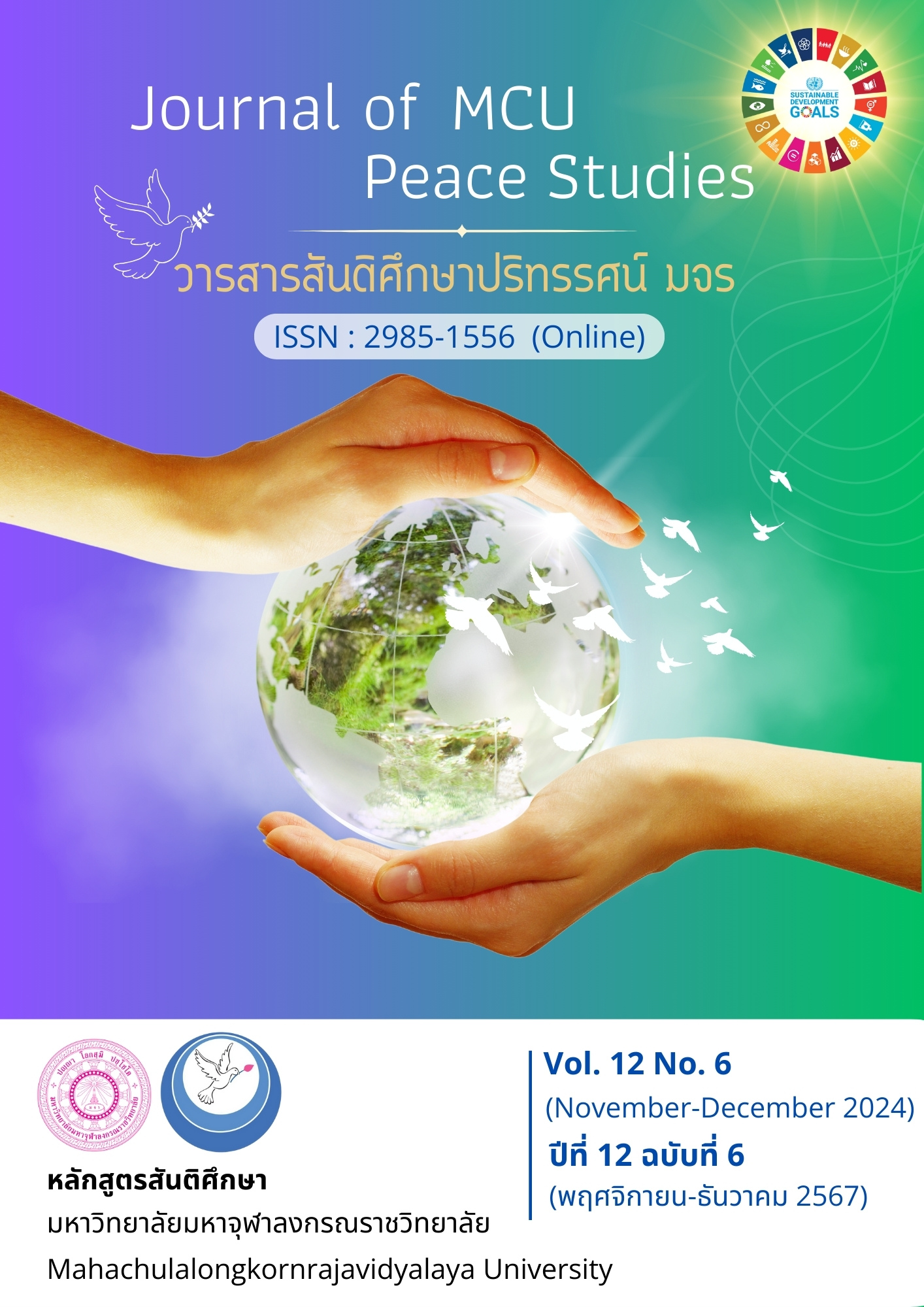การพัฒนานวัตกรรมการเรียนรู้ตลอดชีวิตเพื่อเสริมสร้างความรอบรู้เกี่ยวกับเป้าหมายการพัฒนาที่ยั่งยืนของเยาวชนไทย
Main Article Content
บทคัดย่อ
บทความวิจัยนี้มีวัตถุประสงค์เพื่อ 1) ศึกษาระดับความรอบรู้เกี่ยวกับเป้าหมายการพัฒนาที่ยั่งยืนของเยาวชนไทย 2) พัฒนานวัตกรรมการเรียนรู้ตลอดชีวิตเพื่อเสริมสร้างความรอบรู้เกี่ยวกับเป้าหมายการพัฒนาที่ยั่งยืนของเยาวชนไทย 3) ประเมินผลการใช้นวัตกรรมการเรียนรู้ตลอดชีวิตเพื่อเสริมสร้างความรอบรู้เกี่ยวกับเป้าหมายการพัฒนาที่ยั่งยืนของเยาวชนไทย และ 4) ศึกษาความพึงพอใจของเยาวชนไทยที่มีต่อนวัตกรรมการเรียนรู้ตลอดชีวิตเพื่อเสริมสร้างความรอบรู้เกี่ยวกับเป้าหมายการพัฒนาที่ยั่งยืน เป็นการวิจัยแบบผสมผสาน โดยกลุ่มตัวอย่างของการวิจัย คือ เยาวชนไทย อายุระหว่าง 15 - 24 ปี จำนวน 515 คน และกลุ่มตัวอย่างที่ทดลองใช้นวัตกรรมการเรียนรู้ตลอดชีวิต จำนวน 30 คน เครื่องมือที่ใช้ในการวิจัย ได้แก่ แบบประเมินระดับความรอบรู้, นวัตกรรมการเรียนรู้ตลอดชีวิต, แบบทดสอบระดับความรอบรู้ และแบบประเมินความพึงพอใจที่มีต่อนวัตกรรมการเรียนรู้ตลอดชีวิต ใช้การวิเคราะห์ค่าสถิติ ได้แก่ ความถี่ ร้อยละ ค่าเฉลี่ย ส่วนเบี่ยงเบนมาตรฐาน การทดสอบ t-test และการวิเคราะห์เชิงเนื้อหา
ผลการวิจัยพบว่า 1) เยาวชนไทยมีระดับความรอบรู้เกี่ยวกับเป้าหมายการพัฒนาที่ยั่งยืนต่ำที่สุด ในเป้าหมายที่ 7 รับรองการมีพลังงานที่ทุกคนเข้าถึงได้ เชื่อถือได้ ยั่งยืนทันสมัย 2) การพัฒนานวัตกรรมการเรียนรู้ตลอดชีวิตเพื่อเสริมสร้างความรอบรู้เกี่ยวกับเป้าหมายการพัฒนาที่ยั่งยืนของเยาวชนไทย ได้แก่ หนังสือการ์ตูนความรู้และเกมกระดาน 3) ผลการประเมินการใช้นวัตกรรมการเรียนรู้ตลอดชีวิตเพื่อเสริมสร้างความรอบรู้เกี่ยวกับเป้าหมายการพัฒนาที่ยั่งยืนของเยาวชนไทยพบว่า กลุ่มตัวอย่างมีคะแนนการทดสอบหลังเรียน ( = 11.97, S.D. = 0.99) สูงกว่าก่อนการใช้นวัตกรรมการเรียนรู้ (
= 7.37, S.D. = 1.97) และเมื่อเปรียบเทียบโดยทดสอบสมมติฐานด้วย t-test พบว่ามีความแตกต่างกันอย่างมีนัยสำคัญทางสถิติที่ระดับ .05 และ 4) ผลการศึกษาความพึงพอใจของเยาวชนไทยที่มีต่อนวัตกรรมการเรียนรู้ตลอดชีวิตเพื่อเสริมสร้างความรอบรู้เกี่ยวกับเป้าหมายการพัฒนาที่ยั่งยืน พบว่า มีความพึงพอใจต่อนวัตกรรมการเรียนรู้ตลอดชีวิตเพื่อเสริมสร้างความรอบรู้เกี่ยวกับเป้าหมายการพัฒนาที่ยั่งยืนอยู่ในระดับมากที่สุด (
= 4.78, S.D. = 0.45) เมื่อพิจารณาเป็นรายประเด็นพบว่า กลุ่มตัวอย่างเห็นว่า นวัตกรรมการเรียนรู้ตลอดชีวิตส่งเสริมหรือกระตุ้นให้เกิดความรู้ใหม่ในระดับมากที่สุด (
= 4.87, S.D. = 0.35)
Article Details

อนุญาตภายใต้เงื่อนไข Creative Commons Attribution-NonCommercial-NoDerivatives 4.0 International License.
ทัศนะและความคิดเห็นที่ปรากฏในบทความในวารสาร ถือเป็นความรับผิดชอบของผู้เขียนบทความนั้น และไม่ถือเป็นทัศนะและความรับผิดชอบของกองบรรณาธิการ ยินยอมว่าบทความเป็นลิขสิทธิ์ของวารสาร
เอกสารอ้างอิง
Areekul, C. (2020). The Development of Learning Innovation as Board Game for Enhancing the Active Citizen of the Undergraduate. Pañña Panithan Journal, 5(2), 137-150.
Bunnag, C. et al. (2018). Research Coordination for SDGs. (Research Report). Bangkok: Thailand Research Fund.
Centre for SDG Research and Support, Faculty of Economics, Thammasat University. (2020). Sustainable Development Goals for Thai Children and Youth. Retrieved January 1, 2024, from https://www.sdgmove.com/2017/03/06/
Chukam, B. (2007). The Effect of Using Cartoon Mathematics E-Book Lessons on the Problem of Linear Equation with One Variable on Learning Achievement and Satisfaction in Mathematics Subjects of Mathayomsuksa II Students. (Master’s Thesis). Srinakharinwirot University. Bangkok.
Eiamwilai, W. (2020). The Development of Board Game Based on Critical Thinking to Enhanced Digital Citizenship of 7th Grade Students. (Master’s Thesis). Srinakharinwirot University. Bangkok.
Global Partnership for Education. (2019). Literacy is Key to Achieving the SDGs by 2030. Retrieved January 1, 2024, from https://www.globalpartnership.org/blog/literacy-key-achieving-sdgs-2030
Keawsri, S. (2019). Design and Development a Board Game about the Immune System. (Master’s Thesis). Thaksin University. Songkhla.
Limpremwattana, V., & Thamwattann, K. (2017). Behavior of Playing Board Games and Component of Effective Factors for Playing games of Teenagers in the Bangkok. Journal of Social Research, 40(2), 107-132.
Phdungsilp, A., Areerakuikan, N., & Sukharomana, R. (2017). Survey of the Status of Sustainable Development Goals in the Context of Thailand and Alternative Measures Economic, Social, and Legal in Goal 7: Ensure Access to Affordable, Reliable, Sustainable and Modern Energy for All. (Research Report). Bangkok: The Thailand Research Fund.
Preedakorn, A. (2014). Design a Boardgame to Study Colourcircle for Students in Grade 6. (Master’s Thesis). Srinakharinwirot University. Bangkok.
Reamkidkarn, K., & Chumchua, V. (2019). Impact of Family Card Board Game to Increase Attention and Reduce Inattention, Impulsivity and Hyperactivity in Children with ADHD. Journal of the Psychiatric Association of Thailand, 64(3), 217-234.
Sittiwong, T. (2021). The Effects of Using Board Game to Promote Learning for Undergraduate Students, Faculty of Education, Naresuan University. Journal of Education and Innovation, 23(4), 187-200.
Sripakho, P., Phuphaibul, R., & Kongsaktrakul, C. (2013). The Effects of the Life Skills Development Program Using Cartoon Books Media on Life Skills among Grade Five Students. Journal of The Royal Thai Army Nurses, 14(1), 71-84.
Sukkumnoed, D. (2018). Develop People with Game Mechanics. Bangkok: Faculty of Education Chulalongkorn University.
UNESCO. (2023). Literacy. Retrieved January 1, 2024, from https://www.unesco.org/en/literacy
United Nations. (2022). Policy Briefs in Support of the High-Level Political Forum 2022: Addressing Energy’s Interlinkages with Other SDGs. New York: Department of Economic and Social Affairs, United Nations.
______. (2023). Take an Action for the Sustainable Development Goals. Retrieved January 1, 2024, from https://www.un.org/sustainabledevelopment/sustainable-development-goals/


